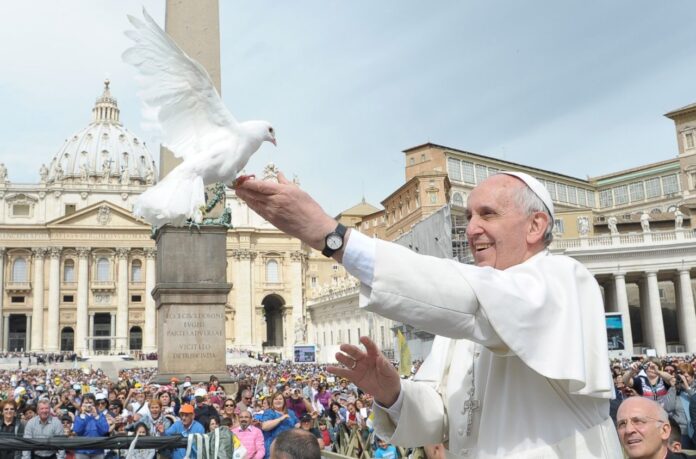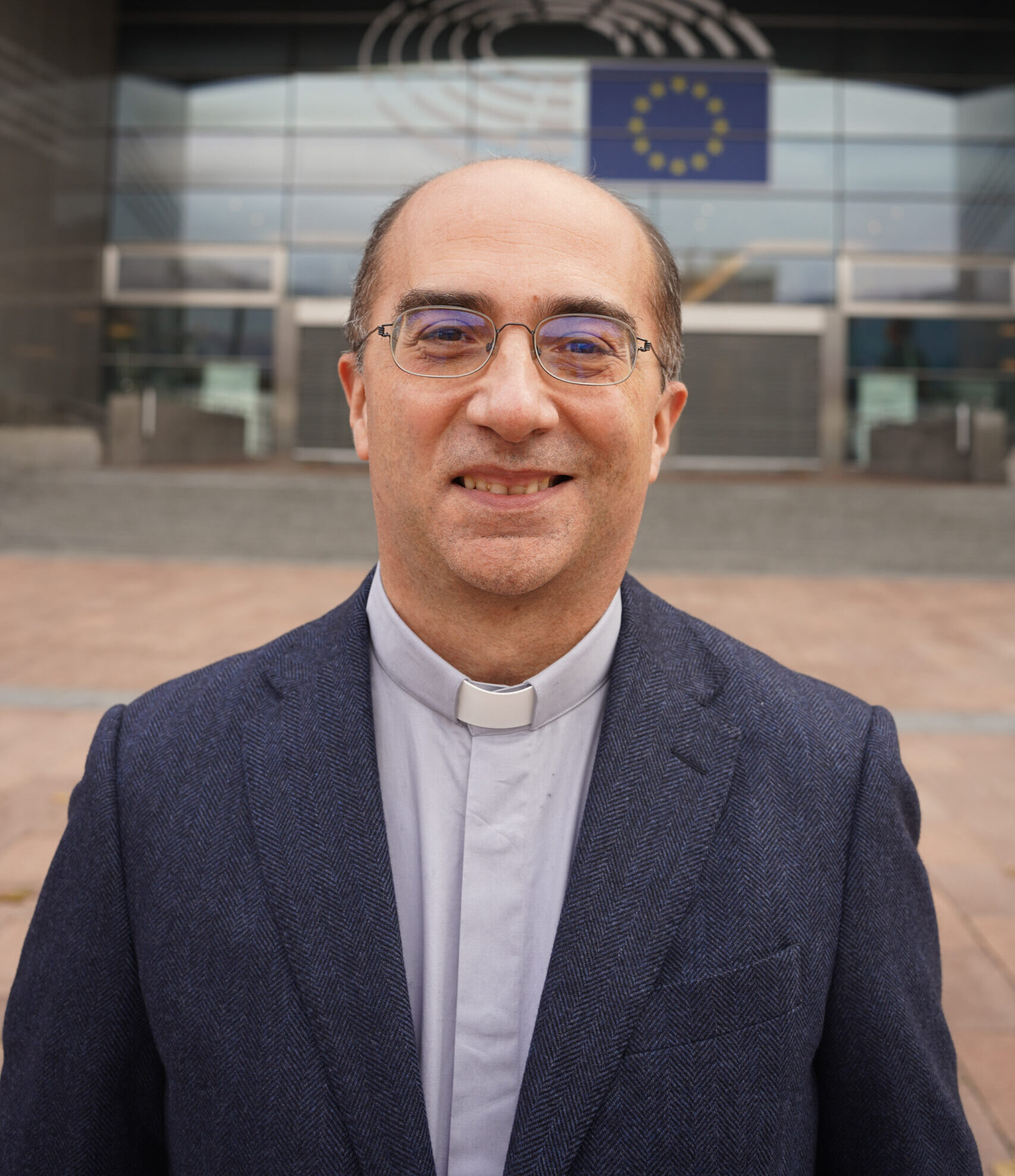Reading the Pope 2022 World Day of Peace in the JESC European Leadership Programme
Dialogue Between Generations, Education and Work: Tools for Building Lasting Peace: this is the title of the Pope’s message for the 2022 Word Day of Peace. Francis usual attention to younger generations is particularly coherent with the European Year of Youth 2022.
From the beginning Pope Francis reminds us: «We can speak of an “architecture” of peace, to which different institutions of society contribute, and an “art” of peace that directly involves each one of us. All can work together to build a more peaceful world, starting from the hearts of individuals and relationships in the family, then within society and with the environment, and all the way up to relationships between peoples and nations».
This appeal to the «path of peace», which Saint Paul VI called integral development, is for everybody. But in a unique way this year, in paragraph two and three, the Message for the World Day of peace confirms and motivates the work in the Jesuit European Social Centre and in the European Leadership Programme. In fact, the Pope proposes «three paths» for building a lasting peace, all of which are at the core of our proposal at ELP: «First, dialogue between generations as the basis for the realization of shared projects. Second, education as a factor of freedom, responsibility and development. Finally, labour as a means for the full realization of human dignity». Because without them, «every project of peace turns out to be insubstantial», and so is unsustainable.
This cross-cutting approach is also promoted by the United Nation 2030 Agenda for sustainable development, that puts a particular emphasis on peace with the SDG 16 (peace, justice and strong institutions) in connection with the SDG 4 (quality education) and the SDG 8 (Decent work and economic growth). Furthermore the UN, in order to promote peaceful and inclusive societies, introduced also to the concept of “sustainable peace” that aims to look beyond crisis management and the immediate resolution of violent conflict, so as to prevent outbreaks, continuation, escalation and recurrence of violent conflict, where dialogue, education and decent work are essential to prevent and deescalate violent conflict.
The 2022 Message for the World Day of Peace considers that the Covid crisis has increased our sense of isolation and tendencies to self-absorption, but also violent protest is always another possible option. Technological and economic development has tended to create a divide between generations. Therefore, the alternative to division, the Pope writes, is dialogue between generations: «Young people need the wisdom and experience of the elderly, while those who are older need the support, affection, creativity and dynamism of the young».
For JESC/ELP, the possibility to promote life in community to our fellows as an alternative to isolation. In addition, the weekly meetings with European leaders are a constant opportunity for dialogue between generations, enforcing mutual trust. This dialogue at ELP between generations should aim, as the Pope states, «to learn how to regain this mutual trust. The loneliness of the elderly is matched in the young by a sense of helplessness and a lack of a shared vision about the future. […] Each must be willing to make room for others and not to insist on monopolizing the entire scene by pursuing their own immediate interests, as if there were no past and future».
This kind of intergenerational dialogue, also in the ELP, refers in particular to the challenges emerging from the present ethical and socio-environmental crisis, to which JESC has dedicated one of its Secretariat. Referring to the elderly, the Pope insists that «we ought to esteem and encourage all those young people who work for a more just world, one that is careful to safeguard the creation entrusted to our stewardship». On the other hand, Francis declares that «the opportunity to build paths of peace together cannot ignore education and labour, which are privileged settings and contexts for intergenerational dialogue. Education provides the grammar for dialogue between generations, and in the experience of labour men and women of different generations find themselves able to cooperate and to share expertise, experiences and skills in view of the common good».
The investment of JESC in ELP in people and in resources is great. This is also a reaction to the fact, underlined by Francis, that «in recent years, there has been a significant reduction worldwide in funding for education and training; these have been seen more as expenditures than investments […]. Military expenditures, on the other hand, have increased beyond the levels at the end of the Cold War and they seem certain to grow exorbitantly». In particular, ELP invests in this intergenerational and mutual educational process through the free and passionate engagement of our mentors and coaches. Because, as the Pope states: «It is my hope that investment in education will also be accompanied by greater efforts to promote the culture of care».
In addition, the traineeship of ELP fellows refers to education but also to labor. It is a help to enter and remain in the job market, with accompanying mentors to reflect about possible career opportunities. Moreover, there is the cura personalis offered by our coaches, through a kind of spiritual conversation, to read and assume in a smart way experiences of life, possibly discerning how the Lord accompanies one’s life.
At JESC we assume than not a country, as the Pope writes, but the entire European Union «flourishes when constructive dialogue occurs between its many rich cultural components: popular culture, university culture, youth culture, artistic culture, technological culture, economic culture, family culture and media culture». For this reason. ELP propones other cultural and spiritual initiatives to its follows and alumni, as the events of the group Passion for Europe.
But a fundamental component of this educational process is the dialogue, the collaboration and the friendship among the fellows and alumni of ELP, that is enlarging to the Jesuit Alumni of Brussels. The experience with people of different national origin, talents, competences and passions enrich young people and strengthens their desire to became European leaders for the common good.
Finally, let’s make the Pope’s final appeal our own: «To government leaders and to all those charged with political and social responsibilities, to priests and pastoral workers, and to all men and women of good will, I make this appeal: let us walk together with courage and creativity on the path of intergenerational dialogue, education, and work. May more and more men and women strive daily, with quiet humility and courage, to be artisans of peace. And may they be ever inspired and accompanied by the blessings of the God of peace! »
One last suggestion: to better enter the spirit of this Message, Justice and Peace Europe promotes an online event that will take place on 27 January from 8.15 am to 9.30 am. MEP François-Xavier Bellamy will be the special guest and comment on the message of the Pope. Zoom link: https://us02web.zoom.us/j/82621152522?pwd=ekNtNFdSdXFjRGs5Wkp0ZUwvNG1hdz09
Luciano Larivera SJ
Secretary for European Affairs



